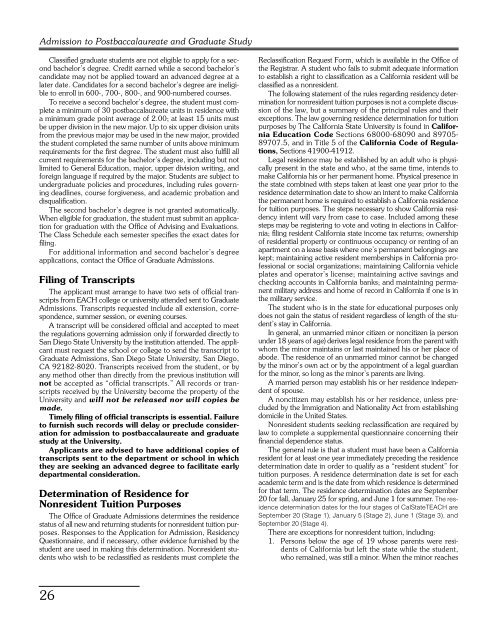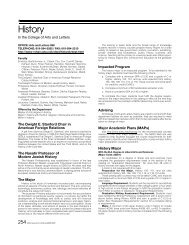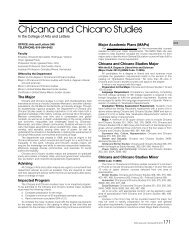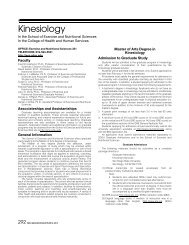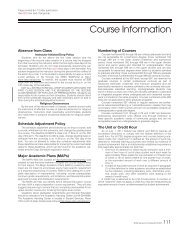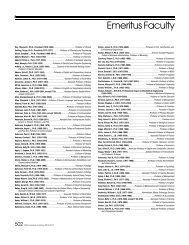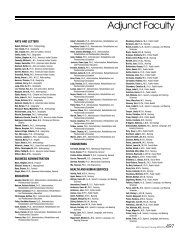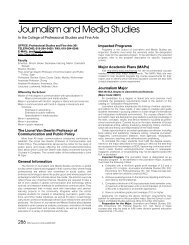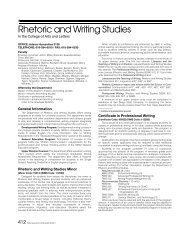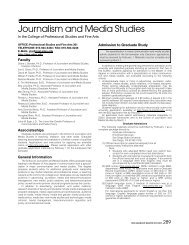President Stephen L. Weber - San Diego State University ...
President Stephen L. Weber - San Diego State University ...
President Stephen L. Weber - San Diego State University ...
You also want an ePaper? Increase the reach of your titles
YUMPU automatically turns print PDFs into web optimized ePapers that Google loves.
Admission to Postbaccalaureate and Graduate Study<br />
Classified graduate students are not eligible to apply for a second<br />
bachelor’s degree. Credit earned while a second bachelor’s<br />
candidate may not be applied toward an advanced degree at a<br />
later date. Candidates for a second bachelor’s degree are ineligible<br />
to enroll in 600-, 700-, 800-, and 900-numbered courses.<br />
To receive a second bachelor’s degree, the student must complete<br />
a minimum of 30 postbaccalaureate units in residence with<br />
a minimum grade point average of 2.00; at least 15 units must<br />
be upper division in the new major. Up to six upper division units<br />
from the previous major may be used in the new major, provided<br />
the student completed the same number of units above minimum<br />
requirements for the first degree. The student must also fulfill all<br />
current requirements for the bachelor’s degree, including but not<br />
limited to General Education, major, upper division writing, and<br />
foreign language if required by the major. Students are subject to<br />
undergraduate policies and procedures, including rules governing<br />
deadlines, course forgiveness, and academic probation and<br />
disqualification.<br />
The second bachelor’s degree is not granted automatically.<br />
When eligible for graduation, the student must submit an application<br />
for graduation with the Office of Advising and Evaluations.<br />
The Class Schedule each semester specifies the exact dates for<br />
filing.<br />
For additional information and second bachelor’s degree<br />
applications, contact the Office of Graduate Admissions.<br />
Filing of Transcripts<br />
The applicant must arrange to have two sets of official transcripts<br />
from EACH college or university attended sent to Graduate<br />
Admissions. Transcripts requested include all extension, correspondence,<br />
summer session, or evening courses.<br />
A transcript will be considered official and accepted to meet<br />
the regulations governing admission only if forwarded directly to<br />
<strong>San</strong> <strong>Diego</strong> <strong>State</strong> <strong>University</strong> by the institution attended. The applicant<br />
must request the school or college to send the transcript to<br />
Graduate Admissions, <strong>San</strong> <strong>Diego</strong> <strong>State</strong> <strong>University</strong>, <strong>San</strong> <strong>Diego</strong>,<br />
CA 92182-8020. Transcripts received from the student, or by<br />
any method other than directly from the previous institution will<br />
not be accepted as “official transcripts.” All records or transcripts<br />
received by the <strong>University</strong> become the property of the<br />
<strong>University</strong> and will not be released nor will copies be<br />
made.<br />
Timely filing of official transcripts is essential. Failure<br />
to furnish such records will delay or preclude consideration<br />
for admission to postbaccalaureate and graduate<br />
study at the <strong>University</strong>.<br />
Applicants are advised to have additional copies of<br />
transcripts sent to the department or school in which<br />
they are seeking an advanced degree to facilitate early<br />
departmental consideration.<br />
Determination of Residence for<br />
Nonresident Tuition Purposes<br />
The Office of Graduate Admissions determines the residence<br />
status of all new and returning students for nonresident tuition purposes.<br />
Responses to the Application for Admission, Residency<br />
Questionnaire, and if necessary, other evidence furnished by the<br />
student are used in making this determination. Nonresident students<br />
who wish to be reclassified as residents must complete the<br />
26<br />
Reclassification Request Form, which is available in the Office of<br />
the Registrar. A student who fails to submit adequate information<br />
to establish a right to classification as a California resident will be<br />
classified as a nonresident.<br />
The following statement of the rules regarding residency determination<br />
for nonresident tuition purposes is not a complete discussion<br />
of the law, but a summary of the principal rules and their<br />
exceptions. The law governing residence determination for tuition<br />
purposes by The California <strong>State</strong> <strong>University</strong> is found in California<br />
Education Code Sections 68000-68090 and 89705<br />
89707.5, and in Title 5 of the California Code of Regulations,<br />
Sections 41900-41912.<br />
Legal residence may be established by an adult who is physically<br />
present in the state and who, at the same time, intends to<br />
make California his or her permanent home. Physical presence in<br />
the state combined with steps taken at least one year prior to the<br />
residence determination date to show an intent to make California<br />
the permanent home is required to establish a California residence<br />
for tuition purposes. The steps necessary to show California residency<br />
intent will vary from case to case. Included among these<br />
steps may be registering to vote and voting in elections in California;<br />
filing resident California state income tax returns; ownership<br />
of residential property or continuous occupancy or renting of an<br />
apartment on a lease basis where one’s permanent belongings are<br />
kept; maintaining active resident memberships in California professional<br />
or social organizations; maintaining California vehicle<br />
plates and operator’s license; maintaining active savings and<br />
checking accounts in California banks; and maintaining permanent<br />
military address and home of record in California if one is in<br />
the military service.<br />
The student who is in the state for educational purposes only<br />
does not gain the status of resident regardless of length of the student’s<br />
stay in California.<br />
In general, an unmarried minor citizen or noncitizen (a person<br />
under 18 years of age) derives legal residence from the parent with<br />
whom the minor maintains or last maintained his or her place of<br />
abode. The residence of an unmarried minor cannot be changed<br />
by the minor’s own act or by the appointment of a legal guardian<br />
for the minor, so long as the minor’s parents are living.<br />
A married person may establish his or her residence independent<br />
of spouse.<br />
A noncitizen may establish his or her residence, unless precluded<br />
by the Immigration and Nationality Act from establishing<br />
domicile in the United <strong>State</strong>s.<br />
Nonresident students seeking reclassification are required by<br />
law to complete a supplemental questionnaire concerning their<br />
financial dependence status.<br />
The general rule is that a student must have been a California<br />
resident for at least one year immediately preceding the residence<br />
determination date in order to qualify as a “resident student” for<br />
tuition purposes. A residence determination date is set for each<br />
academic term and is the date from which residence is determined<br />
for that term. The residence determination dates are September<br />
20 for fall, January 25 for spring, and June 1 for summer. The residence<br />
determination dates for the four stages of Cal<strong>State</strong>TEACH are<br />
September 20 (Stage 1), January 5 (Stage 2), June 1 (Stage 3), and<br />
September 20 (Stage 4).<br />
There are exceptions for nonresident tuition, including:<br />
1. Persons below the age of 19 whose parents were residents<br />
of California but left the state while the student,<br />
who remained, was still a minor. When the minor reaches


